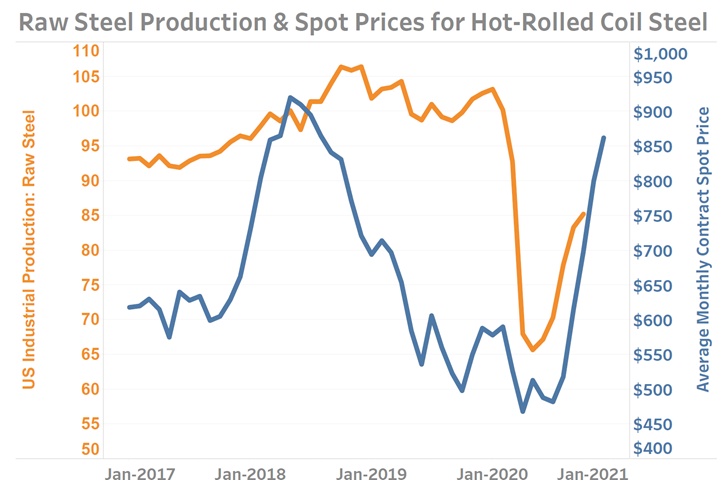COVID-19 Pessimism Results in Steel Supply Shortages
If inflation continues in light of effective vaccines, manufacturing’s greatest problem may not be one of chasing limited demand, but of limited supplies resulting in empty shelves in the face of wanting buyers.
In the years leading up to the COVID-19 pandemic, steel prices had been quite volatile. Spot prices for steel coil during September 2017 sold for as little as $590 per 20-ton contract. This was short-lived as contract prices quickly climbed over the following eight months with some May contracts selling in excess of $925. From there, contract prices experienced a sharp correction over the next 16 months as prices fell by 40% to around $550 per contract. During this period of significant price volatility, steel production was relatively less sensitive to changes in finished steel prices. This is not unusual for industries with high overhead costs.
The steep fall in prices and elevated level of production at the end of 2019 placed the industry in a particularly difficult position at the onset of the COVID-19 pandemic, which would soon see major industries — and, in particular, automotive production — almost completely shut down. The ensuing market disruption resulted in the steepest fall in steel production since the Great Recession in 2008 and, prior to that, in the early 1980s.
As the initial shock during the first half of 2020 faded, steel industry executives would have to make operating decisions based largely on their assumptions about the timing and shape of an eventual market rebound. Cleveland-Cliffs Inc.’s chairman, Lourenco Goncalves, said during his company’s third-quarter 2020 earnings conference call:
“Our strong third-quarter results reflect the positive outcome of the actions we took in Q2, when we saw an opportunity when others were paralyzed. During the almost three months when our main market, the automotive industry, went through unprecedented shutdowns across the entire sector, we prepared our inventories and our plants to be ready as soon as our clients were back in business. As a direct consequence of that, we generated $150 million in free cash flow during the quarter.”
Manufacturing’s greatest problem may not be one of chasing limited demand, but of limited supplies.
This mindset has clearly benefited Cleveland-Cliffs and other companies like it which have prepared for the stronger and quicker-than-expected rebound already being felt this year. Domestic consumerism in recent months has seen price inflation resulting from demand exceeding available supplies for everything from medical goods to a whole host of unexpected goods, such as high-ticket vehicles, RVs, boats and even a child’s pedal bicycle. Should this trajectory continue in light of the recent distribution of highly effective vaccines, manufacturing’s greatest problem may not be one of chasing limited demand, but of limited supplies resulting in empty shelves in the face of wanting buyers.
Gardner Intelligence has pressed the case for manufacturers to prepare for 2021 by focusing their efforts to strengthen the durability of their supply chains. Should demand for goods continue to rebound and exceed expectations — as they have in recent months and as efforts increase to reshore U.S. supply chains — it will be essential for U.S. manufacturers in the immediate future to improve the durability of their supply chains and supply networks.

Measures of raw steel production remained little changed during 2019 while steel prices fell. Contract prices are averages of higher-frequency data calculated by Gardner Intelligence from www.investing.com. Industrial Production figures are from the Federal Reserve.
Read Next
Unique 2020 Recession Impacts Market Segments Differently
There are many reasons why the present recession requires business leaders to think differently about this recession and not necessarily rely on the lessons learned from past downturns.
Read MoreEmerging Leaders Nominations Now Open
Here’s your chance to highlight a young person in your manufacturing business who is on the path to be a future leader moving your company forward.
Read More5 Aspects of PMTS I Appreciate
The three-day edition of the 2025 Precision Machining Technology Show kicks off at the start of April. I’ll be there, and here are some reasons why.
Read More
.jpg;width=70;height=70;mode=crop)

















